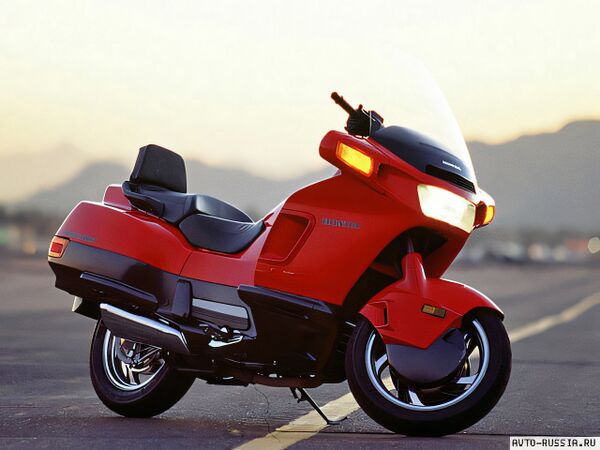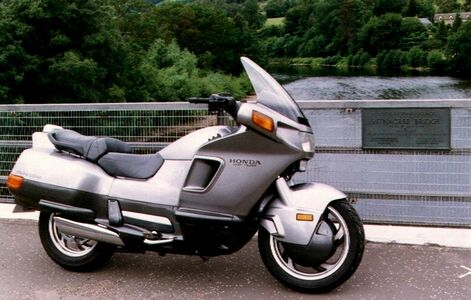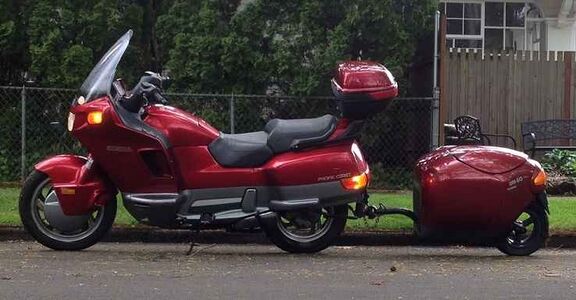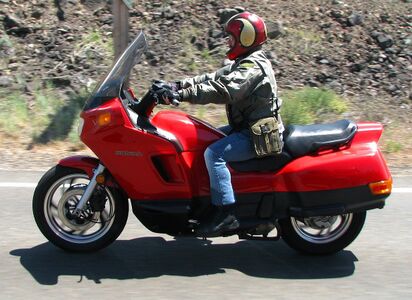Difference between revisions of "Honda PC800"
m |
m (→Photos) |
||
| (5 intermediate revisions by the same user not shown) | |||
| Line 1: | Line 1: | ||
| − | {{DISPLAYTITLE:Honda PC800 (Pacific Coast)}} | + | {{DISPLAYTITLE: Honda PC800 (Pacific Coast)}} |
| − | |||
{{#seo: | {{#seo: | ||
| − | |keywords= | + | |keywords={{PAGENAME}}, review, specs, owners manual, service manual, guide |
| − | |og:image=https://enduro.team/images/d/d9/Honda_pc800_2.jpg | + | |og:image=https://en.enduro.team/images/d/d9/Honda_pc800_2.jpg |
}} | }} | ||
__notoc__ | __notoc__ | ||
| − | [[file:Honda pc800 2.jpg| | + | [[file: Honda pc800 2.jpg | 600px | center | Honda PC800 (Pacific Coast)]] |
| − | + | The Honda PC800 (Pacific Coast) touring motorcycle model appeared in 1989 with the filing of the American division of Honda Research America and was focused primarily on the North American market. Meanwhile, the motorcycle was also sold for a limited time in Europe and Japan. | |
{{Ads_top}} | {{Ads_top}} | ||
| − | + | The concept of the Pacific Coast model was quite interesting - the motorcycle should be as practical as possible, designed for use by novice riders and have low maintenance requirements. And they succeeded. The Honda PC800 model turned out to be extremely practical, reliable and convenient for operation: | |
| − | * ''' | + | * '''Developed wind protection'''. Allows you to comfortably move along the track in almost any weather. |
| − | * ''' | + | * '''Multifunctional dashboard'''. Has an automotive style and shows all possible parameters and states of the motorcycle. |
| − | * ''' | + | * '''The presence of a luggage compartment'''. The entire rear of the motorcycle is a huge trunk. |
| − | * ''' | + | * '''Audio system'''. Models 1989-1990 additionally equipped with AM / FM radio. |
| − | * ''' | + | * '''Cardan drive'''. Virtually maintenance-free. |
| − | * ''' | + | * '''Auto turn off turn signals'''. It was present on models until 1997. |
| − | * ''' | + | * '''Hydraulic clutch'''. It is lighter and more convenient than cable, practically does not require maintenance. |
| − | * ''' | + | * '''Hydraulic valve clearance compensators'''. The engine does not require periodic valve adjustment. |
| − | + | The basis of the Honda PC800 was a V-shaped 2-cylinder liquid-cooled engine with a volume of about 800 cc. see, giving out about 57 hp. power and 66 Nm of torque. The motor is similar to the one used on the [[Honda_XRV750_Africa_Twin | Honda XRV750 Africa Twin]], but with different cylinder bore and crankshaft stroke parameters, as well as changes in the cylinder head (PC800 had hydraulic lifters, XRV750 had a screw and lock nut adjustment). | |
| − | + | The model existed on the market until 1998 inclusive, after which it was discontinued and did not receive further development. In total, approximately 14,000 Honda PC800 (Pacific Coast) motorcycles were sold. | |
| − | == | + | == Photos == |
| − | + | <gallery mode="packed" heights=200px> | |
| − | + | File: PC800.jpg| | |
| − | + | File: Davidcockrellpcs.jpg | | |
| − | + | File: Ridingpc800.jpg| | |
| − | + | </gallery> | |
{{Ads_feed}} | {{Ads_feed}} | ||
| − | |||
{{Ads_post}} | {{Ads_post}} | ||
| − | == | + | == Specifications == |
| − | + | Specifications Honda PC800 (Pacific Coast): | |
| − | {| class="wikitable" | + | {| class = "wikitable" |
| − | ! scope="row"| | + | ! scope = "row" | Model |
| − | |Honda PC800 (Pacific Coast) | + | | Honda PC800 (Pacific Coast) |
|- | |- | ||
| − | ! scope="row"| | + | ! scope = "row" | Motorcycle type |
| − | | | + | | tourist |
|- | |- | ||
| − | ! scope="row"| | + | ! scope = "row" | Release year |
| − | |1989-1998 | + | | 1989-1998 |
|- | |- | ||
| − | ! scope="row"| | + | ! scope = "row" | Frame |
| − | | | + | | steel duplex |
|- | |- | ||
| − | ! scope="row"| | + | ! scope = "row" | Engine type |
| − | |2- | + | | 2-cylinder, 4-stroke, V-shaped |
|- | |- | ||
| − | ! scope="row"| | + | ! scope = "row" | Working volume |
| − | |800 | + | | 800 cc cm. |
|- | |- | ||
| − | ! scope="row"| | + | ! scope = "row" | Bore / stroke |
| − | |79 | + | | 79.5 x 80.6 mm |
|- | |- | ||
| − | ! scope="row"| | + | ! scope = "row" | Compression ratio |
| − | |9.0:1 | + | | 9.0: 1 |
|- | |- | ||
| − | ! scope="row"| | + | ! scope = "row" | Cooling |
| − | | | + | | liquid |
|- | |- | ||
| − | ! scope="row"| | + | ! scope = "row" | Number of valves per cylinder |
| − | |SOHC, 3 | + | | SOHC, 3 valves per cylinder (with hydraulic clearance compensators) |
|- | |- | ||
| − | ! scope="row"| | + | ! scope = "row" | Fuel supply system |
| − | | | + | | carburetor, 2x Keihin CV, 36mm |
|- | |- | ||
| − | ! scope="row"| | + | ! scope = "row" | Ignition type |
| − | | | + | | transistor |
|- | |- | ||
| − | ! scope="row"| | + | ! scope = "row" | Maximum power |
| − | |56 | + | | 56.5 h.p. (41.6 kW) at 6500 rpm |
|- | |- | ||
| − | ! scope="row"| | + | ! scope = "row" | Maximum torque |
| − | |65 | + | | 65.7 Nm (6.7 kg-m) at 5500 rpm |
|- | |- | ||
| − | ! scope="row"| | + | ! scope = "row" | Gearbox |
| − | |5- | + | | 5-speed |
|- | |- | ||
| − | ! scope="row"| | + | ! scope = "row" | Drive type |
| − | | | + | | cardan |
|- | |- | ||
| − | ! scope="row"| | + | ! scope = "row" | Front tire size |
| − | |120/80-17 (61H) | + | | 120 / 80-17 (61H) |
|- | |- | ||
| − | ! scope="row"| | + | ! scope = "row" | Rear tire size |
| − | |140/80-15M/C (67H) | + | | 140 / 80-15M / C (67H) |
|- | |- | ||
| − | ! scope="row"| | + | ! scope = "row" | Front brakes |
| − | |2 | + | | 2 discs, 290mm, 2-piston calipers |
|- | |- | ||
| − | ! scope="row"| | + | ! scope = "row" | Rear brakes |
| − | | | + | | drum |
|- | |- | ||
| − | ! scope="row"| | + | ! scope = "row" | Front suspension |
| − | | | + | | 41mm telescopic fork, 145mm travel |
|- | |- | ||
| − | ! scope="row"| | + | ! scope = "row" | Rear suspension |
| − | | | + | | linkage with two shock absorbers (4-stage preload adjustment), stroke - 130 mm |
|- | |- | ||
| − | ! scope="row"| | + | ! scope = "row" | Motorcycle length |
| − | |2290 | + | | 2290 mm |
|- | |- | ||
| − | ! scope="row"| | + | ! scope = "row" | Motorcycle width |
| − | |820 | + | | 820 mm |
|- | |- | ||
| − | ! scope="row"| | + | ! scope = "row" | Motorcycle height |
| − | | | + | | 1370mm - PC800 ('89 -90) |
| − | 1420 | + | 1420 mm - PC800 ('94 -98) |
|- | |- | ||
| − | ! scope="row"| | + | ! scope = "row" | Wheelbase |
| − | |1555 | + | | 1555 mm |
|- | |- | ||
| − | ! scope="row"| | + | ! scope = "row" | Saddle height |
| − | |765 | + | | 765 mm |
|- | |- | ||
| − | ! scope="row"| | + | ! scope = "row" | Minimum ground clearance |
| − | |140 | + | | 140 mm |
|- | |- | ||
| − | ! scope="row"| | + | ! scope = "row" | Acceleration to 100 km / h |
| − | |6 | + | | 6.1 sec. |
|- | |- | ||
| − | ! scope="row"| | + | ! scope = "row" | Maximum speed |
| − | |174 | + | | 174 km / h |
|- | |- | ||
| − | ! scope="row"| | + | ! scope = "row" | Fuel tank capacity |
| − | |16 | + | | 16.0 l |
|- | |- | ||
| − | ! scope="row"| | + | ! scope = "row" | Motorcycle weight (curb) |
| − | |280 | + | | 280 kg - PC800 ('89 -90) |
| − | 281 | + | 281 kg - PC800 ('89 -90) California version |
| − | |||
| − | |||
| − | |||
| − | |||
| − | |||
| − | |||
| − | + | 283 kg - PC800 ('94 -98) | |
| − | |||
| − | + | 284 kg - PC800 ('94 -98) California version | |
| − | |||
| − | |||
| − | |||
|- | |- | ||
|} | |} | ||
| − | == | + | == Fuel consumption == |
| − | + | The officially declared fuel consumption of the Honda PC800 (Pacific Coast) is 3.84 liters per 100 kilometers (at a constant speed of 60 km / h). The real consumption, according to the owners (fuelly.com service), is 4.9 liters per 100 km. | |
| − | == | + | == Documentation == |
| − | * [[Honda_PC800:_manuals|Honda PC800 | + | [[Category:Motorcycles]] |
| + | * [[Honda_PC800:_manuals|Honda PC800]] | ||
== == | == == | ||
{{Ads_recomended}} | {{Ads_recomended}} | ||
Latest revision as of 13:43, 27 June 2023
The Honda PC800 (Pacific Coast) touring motorcycle model appeared in 1989 with the filing of the American division of Honda Research America and was focused primarily on the North American market. Meanwhile, the motorcycle was also sold for a limited time in Europe and Japan.
The concept of the Pacific Coast model was quite interesting - the motorcycle should be as practical as possible, designed for use by novice riders and have low maintenance requirements. And they succeeded. The Honda PC800 model turned out to be extremely practical, reliable and convenient for operation:
- Developed wind protection. Allows you to comfortably move along the track in almost any weather.
- Multifunctional dashboard. Has an automotive style and shows all possible parameters and states of the motorcycle.
- The presence of a luggage compartment. The entire rear of the motorcycle is a huge trunk.
- Audio system. Models 1989-1990 additionally equipped with AM / FM radio.
- Cardan drive. Virtually maintenance-free.
- Auto turn off turn signals. It was present on models until 1997.
- Hydraulic clutch. It is lighter and more convenient than cable, practically does not require maintenance.
- Hydraulic valve clearance compensators. The engine does not require periodic valve adjustment.
The basis of the Honda PC800 was a V-shaped 2-cylinder liquid-cooled engine with a volume of about 800 cc. see, giving out about 57 hp. power and 66 Nm of torque. The motor is similar to the one used on the Honda XRV750 Africa Twin, but with different cylinder bore and crankshaft stroke parameters, as well as changes in the cylinder head (PC800 had hydraulic lifters, XRV750 had a screw and lock nut adjustment).
The model existed on the market until 1998 inclusive, after which it was discontinued and did not receive further development. In total, approximately 14,000 Honda PC800 (Pacific Coast) motorcycles were sold.
Photos
Specifications
Specifications Honda PC800 (Pacific Coast):
| Model | Honda PC800 (Pacific Coast) |
|---|---|
| Motorcycle type | tourist |
| Release year | 1989-1998 |
| Frame | steel duplex |
| Engine type | 2-cylinder, 4-stroke, V-shaped |
| Working volume | 800 cc cm. |
| Bore / stroke | 79.5 x 80.6 mm |
| Compression ratio | 9.0: 1 |
| Cooling | liquid |
| Number of valves per cylinder | SOHC, 3 valves per cylinder (with hydraulic clearance compensators) |
| Fuel supply system | carburetor, 2x Keihin CV, 36mm |
| Ignition type | transistor |
| Maximum power | 56.5 h.p. (41.6 kW) at 6500 rpm |
| Maximum torque | 65.7 Nm (6.7 kg-m) at 5500 rpm |
| Gearbox | 5-speed |
| Drive type | cardan |
| Front tire size | 120 / 80-17 (61H) |
| Rear tire size | 140 / 80-15M / C (67H) |
| Front brakes | 2 discs, 290mm, 2-piston calipers |
| Rear brakes | drum |
| Front suspension | 41mm telescopic fork, 145mm travel |
| Rear suspension | linkage with two shock absorbers (4-stage preload adjustment), stroke - 130 mm |
| Motorcycle length | 2290 mm |
| Motorcycle width | 820 mm |
| Motorcycle height | 1370mm - PC800 ('89 -90)
1420 mm - PC800 ('94 -98) |
| Wheelbase | 1555 mm |
| Saddle height | 765 mm |
| Minimum ground clearance | 140 mm |
| Acceleration to 100 km / h | 6.1 sec. |
| Maximum speed | 174 km / h |
| Fuel tank capacity | 16.0 l |
| Motorcycle weight (curb) | 280 kg - PC800 ('89 -90)
281 kg - PC800 ('89 -90) California version 283 kg - PC800 ('94 -98) 284 kg - PC800 ('94 -98) California version |
Fuel consumption
The officially declared fuel consumption of the Honda PC800 (Pacific Coast) is 3.84 liters per 100 kilometers (at a constant speed of 60 km / h). The real consumption, according to the owners (fuelly.com service), is 4.9 liters per 100 km.
Documentation



